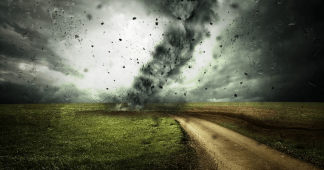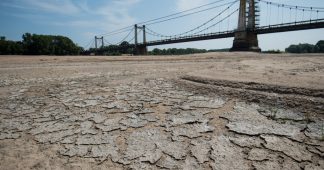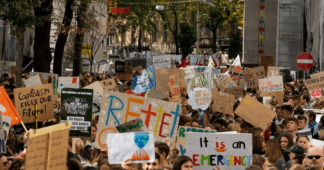“We need a concrete global response that addresses the needs of the world’s most vulnerable people, communities, and nations,” said U.N. Secretary-General António Guterres.
By Kenny Stancil
Governments can either come up with a collaborative and urgent plan to tackle the fossil fuel-driven climate emergency that is already wreaking deadly havoc across the globe or keep allowing corporations to pollute the atmosphere without limit, thereby condemning humanity to a grim future.
That stark warning comes from United Nations Secretary-General António Guterres, who said Monday: “We have a choice. Collective action or collective suicide.”
“It is in our hands,” he told diplomats from 40 countries gathered in Berlin for a three-day conference called the Petersberg Climate Dialogue. The meeting, hosted annually for the past 13 years by the German government, marks one of the last chances to work out an international agenda for mitigation, adaptation, and compensation before the U.N.’s COP27 climate summit kicks off in Egypt this November.
At the conclusion of COP26 eight months ago, Guterres noted, the Paris agreement’s goal of limiting global temperature rise to 1.5ºC above preindustrial levels was left “on life support.”
“Since then, its pulse has weakened further,” he continued. “Greenhouse gas concentrations, sea level rise, and ocean heat have broken new records.”
“Half of humanity is in the danger zone from floods, droughts, extreme storms, and wildfires,” Guterres pointed out. “No nation is immune.”
The U.N. chief’s latest warning comes as large swaths of the planet are being pummeled by heatwaves and wildfires, with no immediate respite in sight—at around 1.2ºC of warming.
Extreme heat has killed more than 1,000 people in Portugal and Spain in recent days, and France is experiencing what experts are calling a “heat apocalypse.” Thousands of people in the region have been forced to evacuate due to wildfires. Meanwhile, the United Kingdom is bracing for its hottest day on record, with temperatures expected to climb even higher on Tuesday.
It’s not just Europe that is being seared. The United States, China, and parts of Africa and the Middle East are also suffering from heatwaves and wildfires, which climate scientists have long warned will increase in frequency and severity as a result of unmitigated greenhouse gas pollution.
And yet, “we continue to feed our fossil fuel addiction,” Guterres lamented Monday. Global energy market disruptions triggered by Russia’s invasion of Ukraine have led many nations to double down on coal, gas, and oil extraction at a moment when investments in a swift green transition are sorely needed.
Most troubling of all, said Guterres, is that governments of the world “are failing to work together as a multilateral community.”
“Nations continue to play the blame game instead of taking responsibility for our collective future,” he said. “We cannot continue this way. We must rebuild trust and come together—to keep 1.5 alive and to build climate-resilient communities.”
In the face of the climate crisis, nations continue to play the blame game instead of taking responsibility for our collective future.
We must rebuild trust & come together – to keep the 1.5° goal alive & build climate-resilient communities.
Promises made must be promises kept.
— António Guterres (@antonioguterres) July 18, 2022
Emphasizing that “time is no longer on our side,” Guterres said that “we need to move forward together on all fronts,” referring to mitigation, adaptation, and financial support for climate-related damages and losses. The latter is a long-standing demand—made by many poorer nations that have contributed the least to the problem but are already bearing the brunt of its consequences—for more green funding from richer nations most responsible for planet-heating pollution.
“First, we need to reduce emissions—now,” Guterres stressed. “Everyone needs to revisit their Nationally Determined Contributions,” he continued, referring to currently inadequate and nonbinding emission reduction targets. “We need to demonstrate at COP27 that a renewables revolution is underway. There is enormous potential for a just energy transition that accelerates coal phase-out with a corresponding deployment of renewables.”
“Second, we must treat adaptation with the urgency it needs,” he said. “One in three people lack early warning systems coverage. People in Africa, South Asia, and Central and South America are fifteen times more likely to die from extreme weather events. This great injustice cannot persist.”
“Third, let’s get serious about the finance that developing countries need,” he added.
While wealthy governments originally vowed to contribute $100 billion annually by 2020 to help low-income nations switch to sustainable energy sources and improve infrastructure, they have missed that target, which is a small fraction of the $4 trillion the World Bank says is necessary. Just $80 billion is expected this year, with the $100 billion pledge now postponed until 2023.
In addition to redistributive investments in mitigation and adaptation, the provision of more money to address the mounting losses and damages from a rapidly changing climate and increasingly frequent and intense extreme weather disasters “has languished on the sidelines for too long,” said Guterres. “It is eroding the trust we need to tackle the climate emergency together.”
“We need a concrete global response that addresses the needs of the world’s most vulnerable people, communities, and nations,” he added. “This has to be the decade of decisive climate action.”
We remind our readers that publication of articles on our site does not mean that we agree with what is written. Our policy is to publish anything which we consider of interest, so as to assist our readers in forming their opinions. Sometimes we even publish articles with which we totally disagree, since we believe it is important for our readers to be informed on as wide a spectrum of views as possible.











